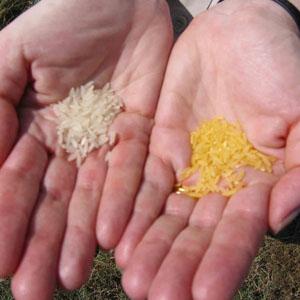
This is the VOA Special English Agriculture Report.
White rice is the world's most popular form of rice. But it goes through a milling process that removes many nutrients. As a result, people who eat a poor diet based on white rice may not get enough vitamin A.
Each year an estimated 250,000 to half a million children go blind from vitamin A deficiency. The World Health Organization says half of them die within a year of losing their sight. Vitamin A deficiency is a problem especially in Africa and Southeast Asia.
So scientists thought of an answer. They combined white rice with plant compounds that the body can change into vitamin A. The rice contains beta-carotene and other carotenoids. These plant colorings give the rice a golden color.
The scientists also thought of a plan to give away this Golden Rice for free to poor farmers. But the rice is genetically engineered. They say it cannot be made using traditional methods to breed plants.
The scientists worked for ten years, until 1990, to develop the technology to add genes to rice. Then it took nine more years to get the genes they wanted into the seed.
The first field tests took place in 2004 at Louisiana State University in the United States. Golden Rice is currently being tested in the Philippines. It is still not available for general use.
Co-inventor Ingo Potrykus says rice with two added genes will be available in 2013. One gene comes from maize, or corn, and the other from a soil bacterium.
Mr. Potrykus is retired from the Swiss Federal Institute of Technology. He blames the delays on too many rules about genetically modified crops.
Opponents say such crops may cause environmental damage by breeding with conventional plants. Opponents also question the safety of biotech foods.
Mr. Potrykus says Golden Rice has never been shown to be unsafe for the environment or people. Many agricultural organizations support the project.
But there are also critics, including researchers for the environmental group Greenpeace. Several months ago they questioned whether Golden Rice could do much for vitamin A deficiency. They said releasing genetically modified rice in Asia could permanently change traditional rice varieties and wild ancestors of rice.
And that's the VOA Special English Agriculture Report, written by Jerilyn Watson. For more news about rice research, go to voaspecialenglish.com. I'm Bob Doughty.
carotenoid: 類(lèi)胡蘿卜素
'Green Super Rice' about two years away for Asia, Africa
Plan to protect food supply against global warming announced in Rome
(來(lái)源:VOA 編輯:崔旭燕)
